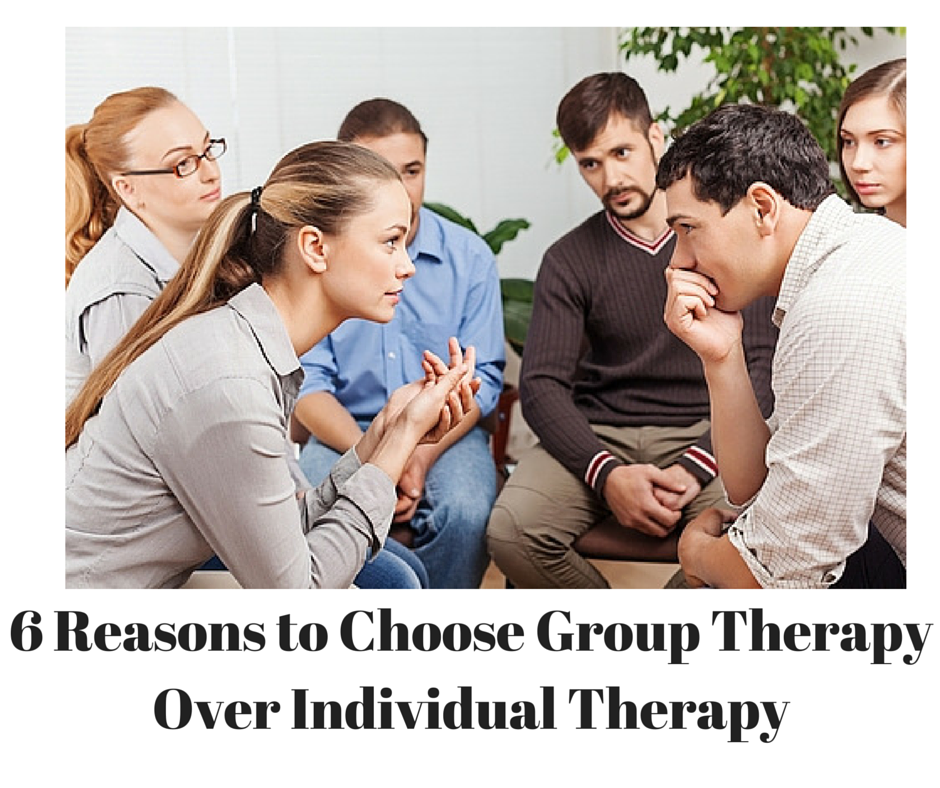Like what you read? Share this post on social media. I believe that when people get to know each other, when they put down the masks, everyone benefits. But if group therapy isn’t your first choice for getting help, you may want to consider these 6 reasons to choose group therapy over individual therapy. 1. You want to try something different You’ve experienced individual therapy before and you wonder how group therapy would be different. You’ve seen group therapy depicted on t.v. and in movies and sometimes it looks goofy and sometimes it looks cool. Only you can judge for yourself. The truth is that group therapy is a very unique experience. Many people rarely have deep, personal conversations in the first place, let alone in a group of strangers. It’s a powerful experience to be yourself with other people. 2. You want to take your individual therapy a step further. You’re doing great work in individual therapy. You’ve discovered a lot about yourself and your relationship dynamics, but you’re not sharing these changes with the people in your personal life yet. Group therapy provides an environment where you can practice vulnerability, honest communication, and assertiveness with other people, without risking your personal relationships. Ideally, you will eventually bring the successes that you’ve had in your group relationships into your personal relationships. 3. You can’t afford individual therapy It’s unfortunate, but it’s true, that some people can’t afford individual therapy, even with insurance coverage. Even those that can afford therapy may end their treatment prematurely due to the expense. Group therapy is less than half the cost of individual therapy, making it accessible to more people. Luckily, group therapy is not a second-rate stand-in for individual therapy. Numerous studies have shown group therapy to be a highly effective form of therapy. As a Certified Group Psychotherapist, deeply involved in the group therapy community, I believe that group therapy provides a highly engaged, present moment encounter that can be much more effective for people. 4. You learn from every group member, not just the therapist. One member might remind you of your mother, another might remind you of a high school bully, and yet another of your best friend. Group therapy allows you to explore the ways that you engage in multiple relationships. Additionally, every group member brings their unique perspectives into the conversation which can be eye-opening and life altering. Watching other members work on their issues can stimulate your own discoveries. The things that you come to learn about other member’s experiences and feelings, creates empathy, understanding and acceptance that has a positive effect on all relationships. 5. Your main goal is to have better relationships. If the thing that is causing the most difficulty for you are your relationships, then it makes sense to work on those issues within relationships. Instead of talking about relationships in individual therapy, you can actually engage in relationships with the group members. 6. You might actually learn more from someone who doesn’t have the same problem as you. People often think that they want to be in a group with people struggling with the same problem as them. The idea is that those with a shared experience can understand better what they’re going through. This is both true and untrue. A person can understand your experience but take it too far and imagine that your experience is exactly like theirs. That’s the trap of being too similar; you can’t see the differences. Yes, they may understand the problem, but like you, they don’t have the solution. There may actually be more to learn from people that don’t have that particular problem. Whether you struggle with anxiety, depression, low self-esteem, relationship issues or addiction, these difficulties can be addressed in group where you receive the help of many and are able to help others in return. Schedule a free 15 minute consultation by calling +1 (818) 245-5298
Rena Pollak, LMFT, CGP | 15720 Ventura Blvd., Ste. 508, Encino, CA 91436 | 818-245-5298 As in most families, my family had secrets too. Those secrets were mostly about how we felt about each other; the love, the hurt, the unspoken judgments about each other. There were also the facts: that there were problems and things that we were ashamed of. But what I could see, from my vantage point as the youngest in the family, was that there was love there too, and that the secrets and lack of communication were getting in the way of that love. On a few momentous occasions, my family took the walls down and spoke to each other and listened to each other. Those moments were powerful and healing. And that’s why I’m a group psychotherapist.
As in most families, my family had secrets too. Those secrets were mostly about how we felt about each other; the love, the hurt, the unspoken judgments about each other. There were also the facts: that there were problems and things that we were ashamed of. But what I could see, from my vantage point as the youngest in the family, was that there was love there too, and that the secrets and lack of communication were getting in the way of that love. On a few momentous occasions, my family took the walls down and spoke to each other and listened to each other. Those moments were powerful and healing. And that’s why I’m a group psychotherapist.
Let’s Talk
or e-mailing me at Therapy@RenaPollak.com
6 Reasons to Choose Group Therapy Over Individual Therapy
- The Desire to Be Great: How to Help Yourself On the Road to Self-Improvement
- Your Independence Day: Conquering Your Negative Beliefs
